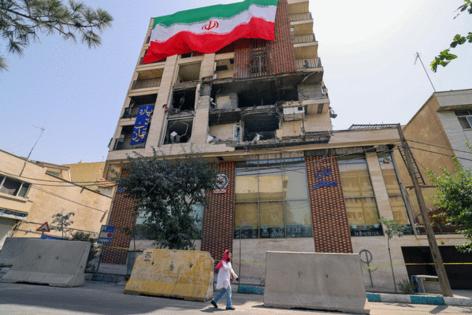Editorial: US diplomats, not bombers, must finish the job in Iran
Published in Political News
American and Israeli forces have done the world a favor by setting back Iran’s nuclear program, whether by a little or a lot. But, unless the U.S. now binds the regime to a deal with strict, long-term constraints on its nuclear activities, the risks they’ve taken may well be for naught.
The Beltway debate over whether Iranian nuclear capabilities have been “obliterated” or can be revived within months largely misses the point. An accurate damage assessment will take weeks, not days, and it will likely require the return of international nuclear inspectors to the sites at Isfahan, Natanz and Fordow.
More importantly, the whereabouts of Iran’s stockpiles of highly enriched uranium remain unclear. Advanced centrifuges may be hidden away. Not all the country’s nuclear scientists have been killed. The possibility that the regime might put those three elements together and race to build a crude nuclear device can’t be ruled out.
In theory, especially if the damage to Iran’s capabilities has indeed been extensive, the U.S. and Israel could hope to monitor the country using satellites and spies, and launch renewed air and missile strikes if a threat is detected. That’s risky, however: Some covert activities might go unobserved, and repeated airstrikes would be costly and become increasingly dangerous as the Iranian military rebuilds its defenses. A similar “mowing the lawn” strategy didn’t prevent Hamas from launching its deadly Oct. 7 attacks.
While the U.S. has a strong hand to play in negotiations, its enthusiasm for them seems to be wavering. At different points, the president has mused that the strikes were so successful a deal might be unnecessary and expressed irritation at Iran’s reluctance to talk.
Meanwhile, the regime has cut off communications with the International Atomic Energy Agency. Even if those leaders in Tehran who favor diplomacy ultimately win out over hard-line rivals, they won’t simply cave to U.S. demands. Reaching a settlement all sides can live with will require patience and discipline — not notable traits of this White House.
Nonetheless, the effort is worth it. If the U.S. wants to ensure security for itself and Israel, it should leverage its current advantages to press for a strong deal that will constrain Iran’s nuclear ambitions over the long term. The basic elements are well-known by now: Inspections would have to be more intrusive than before; any enrichment activities would have to take place offshore and be closely monitored by the U.S.; and there must be no time limits or “sunset” clauses on the restrictions. The regime would have to account for and surrender any remaining advanced centrifuges and highly enriched uranium.
At the same time, the White House can take steps to bolster its own credibility as a negotiating partner. It can officially forswear regime change as a goal and back up that pledge by scaling back the forces it has surged to the region. It can offer a credible, phased schedule of sanctions relief and ensure that Israel publicly supports its negotiating strategy and commits not to sabotage it.
With his sway over Republicans, the president would also have a much better chance than his predecessor of getting a detailed agreement ratified by Congress as a treaty, which would assure Iranian leaders it couldn’t be easily reversed by another administration.
No one is or should be questioning the bravery of the American B-2 pilots or the tactical skill of the U.S. and Israeli militaries. But only diplomats can finish the job they started.
____
The Editorial Board publishes the views of the editors across a range of national and global affairs.
_____
©2025 Bloomberg L.P. Visit bloomberg.com/opinion. Distributed by Tribune Content Agency, LLC.

























































Comments